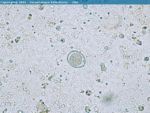- 2 common and 2 less common Isospora species
- Occasionally can cause disease
- Little pathogenicity
- Even if faecal oocyst count is high, other causes of diarrhoea should be looked for
- Hepatozoon americanum and subclinical H. canis in periosteal bone formation
- Both are Tick borne diseases
- H. canis – Rhipicephalus sanguineus
- Ticks become infected by ingesting a blood meal containing macrophages and neutrophils infected with the parasite gamonts -> sexual replication in the gut of the tick -> oocysts containing infective sporozoites -> dogs ingest the tick schizogony occurs in numerous tissues
- Both are Tick borne diseases
[[Category:Dog]
